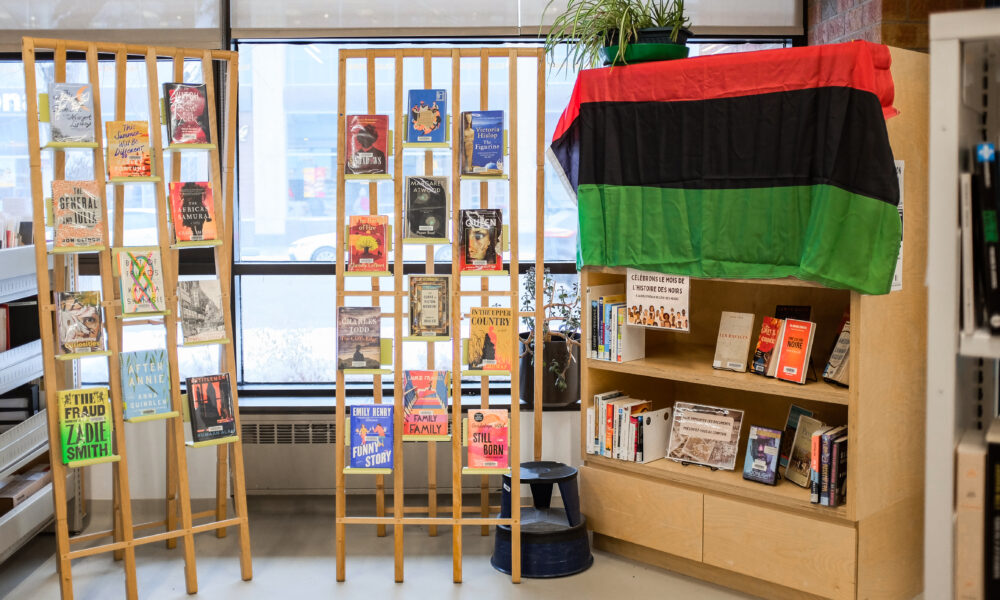This Black History Month, Montreal’s public libraries are doing what they do best: Creating space for learning, reflection, and community. Across the city, library programming—from interactive workshops introducing children to important Black historical figures, to film screenings exploring Black art, culture, and politics—highlights the richness of Black history. Standing alongside bilingual reading lists created to highlight Black authors and texts, these events are a reminder that libraries are more than archives of knowledge; they are living, breathing spaces where history is preserved, stories are shared, and communities come together.
Libraries don’t just help people navigate the present—they anchor us to the past. In a city where Black communities have been pushed to the margins time and again, Montreal’s libraries safeguard and revive histories that might otherwise be erased. Their collections document the city’s Black heritage, their programming celebrates Black voices, and their spaces offer room for Black conversation, organizing, and connection. In Montréal-Nord, Bibliothèque Julio-Jean-Pierre is hosting an art exhibit featuring a diverse range of Black artists, celebrating their foundational contribution to the city’s rich artistic heritage. Beyond the city’s public library system, archives documenting Black history in Montreal continue to expand at Concordia’s Vanier Library, while other municipalities across Quebec have also hosted exhibits in their libraries highlighting significant Black figures in the province’s history. Libraries are one of the few places left where one can exist without expectation, and where the simple act of gathering can be an act of resistance.
As students, libraries are so deeply embedded in our daily lives, and so connected to our rigorous academic schedules, that we often forget what a privilege it is to access them. With the stress of academic life, many of us move through our routines on autopilot, focused on the tasks we complete while in the library rather than the library-visiting experience itself. It mustn’t be forgotten that libraries remain the cornerstones of the communities we come from and enter, offering space for knowledge acquisition and open access to information beyond the classroom. While library engagement in Quebec has been on the rise during recent years, the public library system has yet to return to its pre-pandemic levels of visits and document loans. A major issue is the constant shortage of staff: In 2022, over 1,300 full-time positions remained unfilled across Quebec’s library network. In an era of digital transformation, libraries are being asked to do more with less. And yet, they persist, steadfast in ensuring knowledge remains accessible to all.
More than anything, libraries offer something that can’t be measured: The simple dignity of access. They are one of the few remaining third places in urban life, providing a space for community interaction without requiring a transaction. As Montreal becomes increasingly unaffordable and inhospitable to marginalized populations, libraries stand as an unwavering force of inclusion. For many, a library is one of the first places where they feel a sense of belonging. These spaces also provide essential services: Job search assistance, free Wi-Fi and computers, French and English language classes, and workshops on everything from financial literacy to tenant rights. For those navigating Canada’s complex legal system, many libraries house legal aid clinics. Libraries’ commitment to access extends even further, offering support for marginalized communities through providing undocumented residents proof-of-identity cards to ensure that those without legal status can still participate in the city’s cultural and intellectual life without fear. This is a radical act in a city that so often excludes its most vulnerable.
Libraries are active sites of preservation, empowerment, and resistance. While online access to e-books and archives has its advantages, physical libraries offer something digital platforms cannot: tangible, community-centred spaces that actively break down barriers. They are where erased histories find a voice, where stories are reclaimed and shared. As Black communities continue to fight for equality and justice through education and community-based activism, libraries remain one of the few places where all are welcome—proving, time and again, that survival and knowledge are deeply intertwined.







